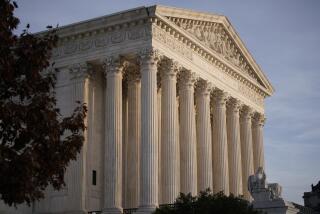U.S. Has 2 Months to Respond in Spying Case
- Share via
COLUMBUS, Ohio — A federal judge gave the government two months to respond to an Ohio truck driver’s request that his terrorism conviction be thrown out on grounds that the government illegally spied on him.
U.S. District Judge Leonie Brinkema cited “the potentially weighty issues raised in the defendant’s motion” in an order Wednesday that set a 60-day timetable for the government to respond to arguments of Iyman Faris, who pleaded guilty in 2003 to collaborating with Al Qaeda in a plot to blow up the Brooklyn Bridge.
For the record:
12:00 a.m. Feb. 15, 2006 For The Record
Los Angeles Times Wednesday February 15, 2006 Home Edition Main News Part A Page 2 National Desk 1 inches; 51 words Type of Material: Correction
Terrorism conviction -- An article in Friday’s Section A, as well as four previous articles, about an Ohio truck driver’s terrorism conviction said Iyman Faris pleaded guilty in 2003 to collaborating with Al Qaeda in a plot to blow up the Brooklyn Bridge. The plot involved severing the bridge’s suspension cables.
Faris’ challenge is among the first to seek evidence of warrantless eavesdropping by the National Security Agency, a practice that began after the Sept. 11 attacks.
Government officials have credited the surveillance with uncovering terrorist plots, including the one by Faris. Critics say President Bush didn’t have the authority to order the domestic surveillance, but he has staunchly defended the practice.
Faris’ lawyer, David Smith, contends investigators improperly obtained evidence against his client, and that the trial lawyer was ineffective, a defense motion filed in federal court in Alexandria, Va., last month stated.
Faris, 36, pleaded guilty in 2003 to conspiracy and aiding and abetting terrorism, and was sentenced to 20 years in prison. He has tried to withdraw his plea.
Prosecutors say that Faris investigated but ruled out using a gas cutter to burn through Brooklyn Bridge suspension cables, and that he received attack instructions from Khalid Shaikh Mohammed, organizer of the Sept. 11 attacks, for what they suggested might have been a second wave of terrorist strikes in New York and Washington.
At his sentencing, prosecutors acknowledged that federal agents were led to Faris by a telephone call intercepted in another investigation.
Ken Melson, the assistant U.S. attorney handling the case, said he could not comment on a pending case.
More to Read
Sign up for Essential California
The most important California stories and recommendations in your inbox every morning.
You may occasionally receive promotional content from the Los Angeles Times.













